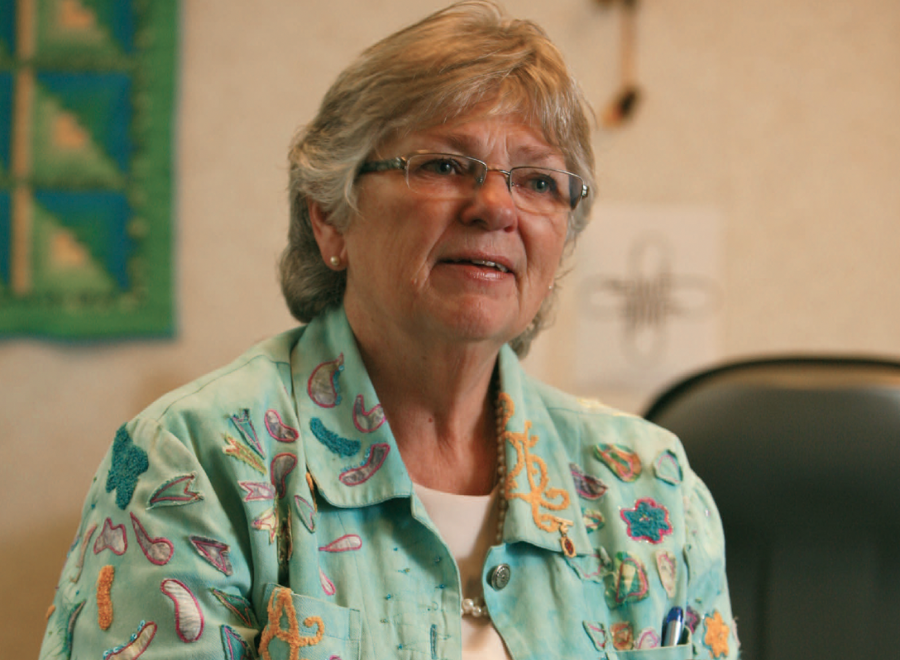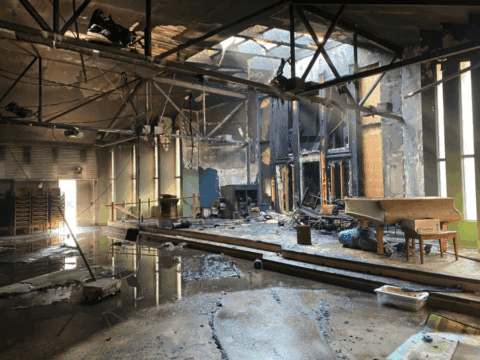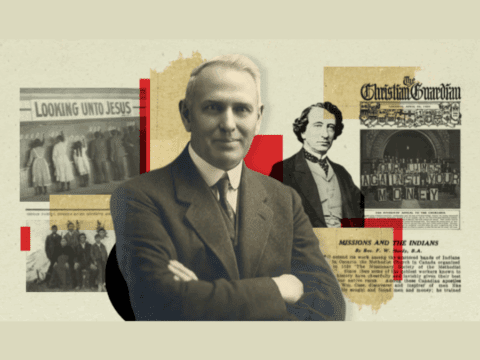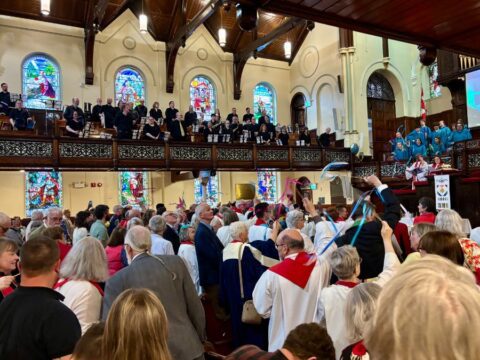Despite its aging and declining membership, United Church Women, the denomination’s main women’s group, will be around for a long time to come, UCW national president Joyce MacKinnon tells David Wilson.
DAVID WILSON: When did you first get involved in the UCW?
JOYCE MACKINNON: My first introduction to UCW would have been in the early 1980s, at Palgrave (Ont.) United. I’m still a member there.
DW: Can you describe the role and status of UCW at that time?
JM: There’s no question, we were the backbone of the church. Anything that needed to be done, UCW was there. We did the cleaning, we did the fundraising, we bought whatever was needed for the church or the manse. We catered the funerals, we spearheaded construction of a new vestibule. We were it.
DW: There wasn’t any concern that the men in the congregation weren’t pulling their weight?
JM: The men pulled their weight — because the women made sure they did! We all worked together. That was what was so wonderful about Palgrave United. And we still work together.
DW: What about now? Is there still an active UCW there?
JM: We’re small. We’re down to six members. When I was first in it there were 15.
DW: Was there a broad generational membership in the Palgrave UCW back then?
JM: Yes there was, and I was the baby!
DW: In those days did you get a sense of the challenges UCW would face down the road?
JM: No. It seemed we would always be there, and that others would come along. There are still younger women in my church doing all those things, but they’re not formally involved in UCW.
DW: Why do you think that younger women don’t become UCW members?
JM: Time constraints. They are moms who have their kids in so many different things. They’re spiritual — I don’t doubt that at all. But they don’t have the time or feel the same need to come to the meetings.
DW: Do you think the rise of feminism in the 1980s and ’90s had anything to do with the reluctance of younger women to take on the traditional duties and responsibilities of UCW?
JM: I can’t answer for everyone because my exposure to UCW at that point was limited to my church at Palgrave. It wasn’t an issue for our congregation. Our men were with there with us at the kitchen sink.
DW: At what point in your involvement in UCW did you start to take a more active role?
JM: When I retired from teaching. I was able to go my first presbyterial meetings, and I thought they were great. There was so much support there, especially after I became president of the presbyterial. That’s one thing younger women need to know: there’s always someone there to walk you through the things you don’t know. The other thing is that once you’re involved, you meet all these wonderful women who feel, as I do, that the time has come to give something back for all of the things that have been given to us.
DW: Do you see your role in UCW as leading the organization in a particular direction, or is it a job that involves maintaining what’s already there?
JM: I think it’s about encouraging and inspiring existing members. Creating excitement, keeping hope up. When you’ve got a black cloud, it’s going to rain. When you look at the sunshine, people are going to say, “Hey, they’re having fun. They’re not just a bunch of white-haired old ladies.” We need to get the word out that we’re strong; we’re not dying. We’re small, but I’m sure our mothers felt the same way sometimes.
DW: How has the creation of an umbrella organization for all United Church women’s groups, including UCW, affected your membership?
JM: At first there was fear about what might happen to us. But it was fear for nought. If anything, it strengthened our organization, made us more determined not to lose it. There are other women’s groups in the church, and for some of the younger women that is what they need. If they’re coming together for fellowship, for spirituality, that’s great.
DW: One often hears from older women who remain in UCW that they don’t want to do the fundraising, the catering, the cleaning up any more. Who will do it if UCW doesn’t?
JM: There’s no getting around that this is happening, especially in the smaller churches. A lot of women say it’s taking too much time, it’s taking too much out of them health-wise. It happened at Palgrave United. The congregation understood, realized how these things are such a big part of our life as a church, and came together to make sure the work still got done.
People need to realize that UCW’s purpose is not fundraising. I was very vocal about this when I was Toronto Conference UCW president and invited to all the annual meetings of Conference. At one point, we were hearing that UCW was being listed as a line in church budgets — UCW is expected to raise such-and-such. It happened in my own church. Our response was, “Whoa, wait a minute! We’ll help where we can but don’t expect we’ll contribute X amount of dollars.” Fundraising is now the responsibility of the whole congregation.
DW: Do you get much of a chance to share your concerns and dreams with similar organizations in other denominations?
JM: Probably not as much as we should. Last spring, I attended an event put on by Presbyterian women. They had invited two UCW members, two Anglicans and two Roman Catholics to sit on a panel. From listening to the discussion, it was clear that we’re all concerned about the same things. We came away thinking we should do more of this in our Conference and at the national level.
DW: How important are UCW’s global links?
JM: The UCW was a union of the Woman’s Missionary Society and the Woman’s Association. The WMS supported, and in many cases supplied, the United Church’s missionaries overseas. Since our formation in 1962, a part of UCW has always honoured that, partly through our continuing and significant support of the Mission and Service Fund. Many of our women have travelled overseas to witness the work of our overseas partners. Since 2006, I have had the opportunity to travel to Mozambique and South Korea. In October 2008, UCW sent a group of women to Cuba. In all cases, the message was clear: thank you, United Church, for your support. We have a responsibility to continue to support the M&S in any way we can.
DW: Currently, the UCW national president is not automatically a commissioner to the General Council. You are quite insistent that UCW should be formally represented. Why?
JM: We represent over 55,000 women across the country. That many women should have some kind of voice at General Council. Since 1962, we’ve raised over $118 million for the Mission and Service Fund. We’re still raising about $2 million a year for M&S. That’s another good reason to be represented. Right now, the only way for the UCW president to go to General Council is for her to be named a commissioner by her Conference. I went as a Conference delegate last time, so it’s quite probable I won’t be going this time. That’s fair enough. But I think we should have a formal presence there in addition to the informal things like our displays and leading worship.
DW: Do you believe that UCW will still be around by the time your daughters are your age?
JM: I can’t say definitely. But my hope suggests it will be. A lot of women are like me; we fall away from the church for a while, then find our way back because that’s where our roots are. Part of it is coming back to the organizations your mother was in. It’s like coming home.
***
This story first appeared in The United Church Observer’s January 2009 issue with the title “’There’s no question, we were the backbone of the church.’”














